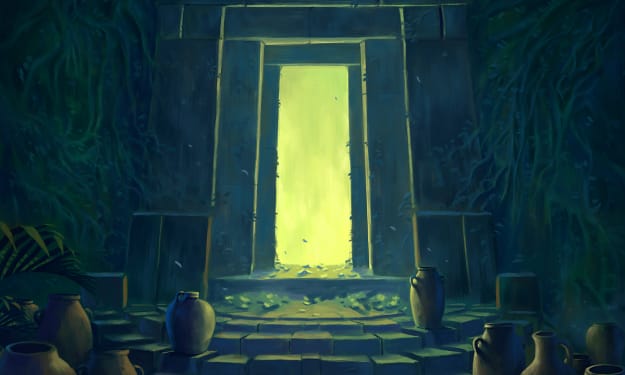Mars: A Thought Experiment
Life On The Red Planet

Introduction
Climate change, global warming, environmental destruction it doesn't matter what you call it. Human beings are destroying this earth at an unprecedented rate. Naturally people are looking for solutions, looking to the stars to quench their imaginations for survival. They see an opportunity to start over. To possibly take what humanity has learned for thousands of years. Evolution spinning its web of inter-species connection, providing for the perfect environment for apes to become human. Much like the planet itself a seemingly Goldie Locks scenario for natural selection. Ending in a hyper conscious species that has imprinted its history onto the landscapes of planet earth.
Yet, ironically our poor management of the planet has made the inhospitable environment of Mars look appealing. Why would a planet millions of miles away with no breathable air or liquid water be a place where we would willingly go? Would humanity do any “better”?
Life on Mars
I propose that we possibly could do better for a couple of reasons: The first reason has to do with the environment on Mars. It is a place that did not evolve in parallel with humanity so nature can not be the backdrop of equality. Locke uses this logic to justify the inequality that develops as humans live their lives. It presupposes an equality of opportunity which is nature. For Locke, “This equality of men by nature, is evident in itself, and beyond all question, making it the foundation of that obligation to mutual love amongst men, on which he builds the duties they owe one another (Locke 8)”. Nature as the mutual love amongest men. Yet on mars this is the farthest thing from the truth. Nature, on Mars does not create a self evident equality from which we can all build from. That very base of equality would have to be artificially built through co-operation. I believe that this forced co-operation to create a livable environment would go beyond what we see on earth when we fight to survive.
If we think that the earth is constantly trying to kill us then Mars would be death incarnate. The extreme inhospitable environment of Mars I think would change how humans interact and evolve due to nature as we know it being absent. The only remnants of earth nature would be each other. So to expand this nature onto a new planet we would mean having to interact most with each other and not exploitative practices. Because exploitation of each other on Mars would mean death. While on earth exploitation is what human life has been built upon for centuries due to the perfect backdrop nature provides for us. But on mars, there is no where to go, no place where a human could even imagine living alone. “Poverty is the passive bond which causes the human being to experience the need of the- greatest wealth-the other human being (Marx 91).
Again, But why? Isn’t the Earth easier to fix? This initial motivation is likely the most baffling. In this paper I put forth a vision that builds off of logics of co-operation but it is just as likely that the mars project becomes another vehicle for exploitation. Another way to individualize and commodify humanity with the pipe dream that Mars would be different. A future where the most vulnerable on earth are given irresponsible loans to go join a Mars colony where they would then be expected to pay off their debt via the development of said colony. As it seems right now maybe even for the development of a corporations profits (I.e Space X).
Why leave all that the earth has to offer? Regardless of all the practical, logical, and economic reasons I think there is something deeper to this question. Once again borrowing from Marx we see that this need to go into the stars may come from a more primordial desire. A human desire that differs from animals. “An animal produces only itself, whilst man reproduces the whole of nature” (Marx 76). For this reason I would argue that the very want to reach uninhabited planets is due to this faculty humans enjoy. The ability to reproduce the whole of nature. But on earth we can only partially recreate nature as part of it and along side it. On mars it is the ultimate fetization of the human ideal. A place where our nature exists in fragments but not as a unified system as on earth. This might be the ultimate challenge and calling of humanity. The opportunity to recreate Earth’s nature from scratch. Humanity as the seed of creation, this ability and desire being the marker of human consciousness.
Starting Over With Knowledge
Human history and the history of the earth have been one. Humanity has developed and complicated its existence all the while philosophizing about the meaning of life, morality, and ethics. It is hard to distinguish what events have been the most significant and which simply are given the status of significance. It is hard on Earth to accurately trace the origins of society and the state. There are competing parallel community perspectives on the earth that developed alongside each other seeing as humans quickly spread around the globe. Developing together but independently. This development is what allowed us to imagine concepts around “good” and “evil”. But as Nietzsche shows us these labels are fluid and have been throughout history. “Good” meaning something in 1000 BC while in 2022 it entails completely different attributes. The question then being “under what conditions did man invent the value-judgements good and evil? And what value do they themselves possess” (Nietzsche 2).
If we imagine a community living on another planet with little to no contact with the earth could we also then assume that different value-judgements would be possible? Emphasis on possible. The Mars experiment would in many ways test the idea that the human condition is something developed internally. If humanity were to recreate the same systems and power structures on a planet that has completely different environmental factors it would indicate that humans have an internal structure that it imprints on its environment in a consistent way.
On mars there would be no territorial history, no border wars, no cultural bias, no competing neighboring state. But would humanity create them out of nostalgia? Or would we be politically decolonized by the very virtue of millions of miles in a vacuum?
On earth the western concept of the state was fashioned in order to control resources and territory. On mars there would be the opportunity to start with all of the knowledge we have now but, without the pressures that have developed in parallel on earth due to growing population and resource scarcity. On the red planet the scenario would be different since political ideas have already developed through blood and sweat on earth. They could be transferred over without the complicating pressures that make actuating on our most lofty goals seemingly impossible due to the complicated legacy that exists on Earth.
“...for local communities, becoming a nation-state itself was the only way to survive the encounter with the instigator, Western nation-states; if not, communities had to either hide in remoteness or simply disappear” (Kohso 59). This pressure from the west, to become a nation-state wouldn't exist on mars. Thus, making the self help system a non factor, a world in anarchy? No a world in desolation. Anarchy on earth, a blessing, compared to the impossibility of it on mars. Anarchy prerequisiting life.
Conclusion
Mars is a lifetime away whether it be the trip there or the technological advancement. Starting over with no history on mars seems like an interesting solution to our struggles on earth, but why is it that we can only imagine a better world on another planet? A planet we cannot even get to, let alone live on. Its interesting that as a society we have reached such a state of confusion that we gravitate toward the literally impossible as a solution. This is our planet and we should learn to live on it as if we were on Mars. So that when the opportunity becomes a reality we are not reaching for unrealistic goals that we could never achieve on our home planet… The planet we arguably have the greatest chance of thriving on. If we cant do it here we cant do it anywhere. I waxed poeticly about the opportunities on Mars and if any of that seemed appealing then why not first on earth?
History doesn't have to weigh on our conscious like a nightmare. As a society we can start to come to terms with our path here in order to launch from a new point. A point where we imagine the same possibilities as dreamed of on a far away planet. The far away planet being closer than any of us could have imagined. It being here and now.
Works Cited
Engels, F., & Marx, K. (1978). The Marx-Engels Reader (R. C. Tucker, Ed.; 2nd ed.). WW Norton.
Kohso, S. (2020). Radiation and Revolution. Duke University Press.
Locke, J. (1980). Second treatise of government (C. B. Macpherson, Ed.). Hackett Publishing.
Nietzsche, F. (2008). On the Genealogy of Morals: A Polemic. By way of clarification and supplement to my last book Beyond Good and Evil. Oxford University Press.
About the Creator
Arjuna Fournier
Political Scientist writing research proposals, theory essays, and sometimes your random short story.






Comments
There are no comments for this story
Be the first to respond and start the conversation.